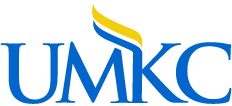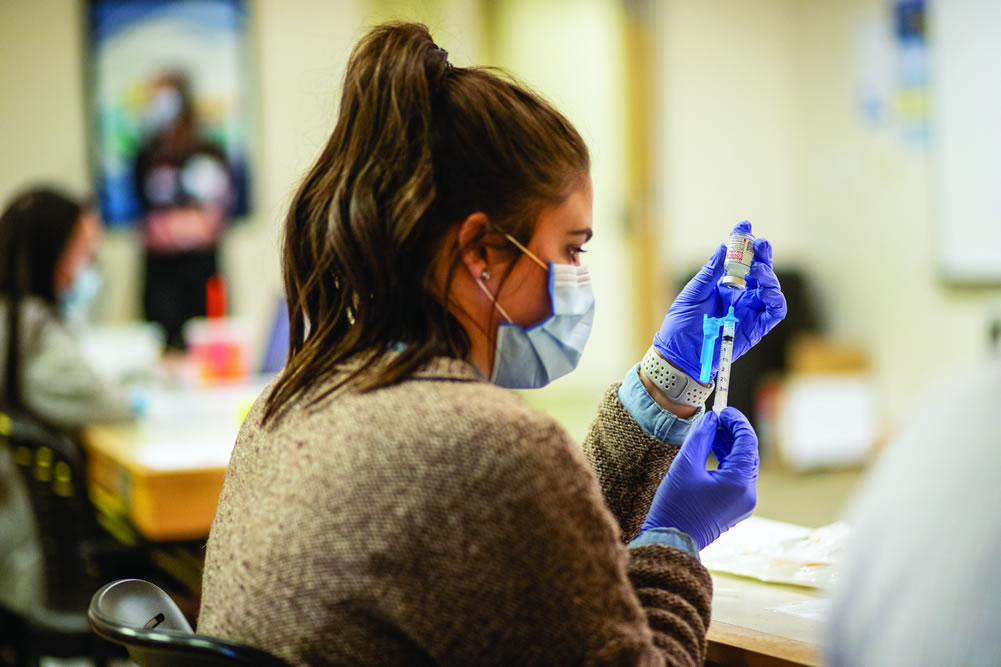By GREG HACK
From screening the first citizens returning from overseas to the push to vaccinate Kansas City, UMKC dentistry has helped fight the pandemic
COVID-19 was declared a pandemic, he was called on to use those skills at Travis Air Force Base northeast of San Francisco.
“We were told we were going to be taking care of some Americans who were back from celebrating Chinese New Year in a little town in China called Wuhan,” McCunniff said.
He was part of a team that tended to about 200 people who had been flown back to the United States on a chartered 747. Some had to be hospitalized, he said, and a few of them died. The majority fared better, though, housed in isolation in a hotel-like structure on the air base and monitored carefully by McCunniff and others.
If the people returning from Wuhan had been happy and relieved to be released after their quarantine, the group from the cruise ship was positively overjoyed when its two weeks was over.
“The morning that they left, we were there at 4:30 in the morning, and I tell you they were ready to go,” McCunniff said. “They truly appreciated everything we had tried to do for them. If anything about a pandemic can be fun, that was fun.”
At his last federal quarantine assignment, at an air base outside Atlanta, he got a deeper appreciation of COVID-19’s potential perils. A physician at the base said he had come from a posting in South Africa, where he had been working on
“We were told we were going to be taking care of some Americans who were back from celebrating Chinese New Year in a little town in China called Wuhan.”
– MICHAEL MCCUNNIFF (DDS ’83)
Pandemics have a way of upending expectations. Fortunately alumni, faculty and students of the UMKC School of Dentistry have a way of forging ahead regardless of obstacles and challenges, fulfilling the school’s mission to serve society and care for patients.
That’s how Michael McCunniff (DDS ’83) in early 2020 ended up helping quarantine a planeload of passengers returning from Wuhan, China.
That’s how Meghan Wendland, a new member of the faculty when the coronavirus hit, ended up arranging treatment for students with COVID-19, and then a year later training dozens of dental students to give pandemic-busting vaccines.
It’s also how Tiara Fry, DDS Class of 2022, found herself learning to administer vaccines and then, along with McCunniff and Wendland and others from the school, inoculating members of the Kansas City and UMKC community.
So much for retirement
In February 2020, McCunniff thought he was easing toward retirement after taking emeritus status the previous spring. The longtime chair of the Department of Dental Public Health and
Behavioral Science was working two days a week at the school, helping his successor and others in that department take over his previous duties.
When he joined the faculty in 1991, McCunniff brought several years in private practice and certification in public health dentistry to the school. For three decades he helped make public health a priority for the School of Dentistry, shaping and teaching the curriculum, arranging student rotations to urban and rural health clinics, and helping students find scholarships and placement in public health jobs.
McCunniff also pursued his interest in forensic dentistry and emergency response work as a member of the National Disaster Medical System and Missouri’s State Emergency Management Team.
During the H1N1 pandemic, he was trained to run a quarantine operation, whether at an international border, a port or an airport. In February 2020, before
Rather than heading home when that first quarantined group did, McCunniff stayed at the base until early March for another assignment: Americans who had endured a long, fearful quarantine in Japan on the Diamond Princess cruise ship were coming back to the United States.
“These folks had already been through a lot,” McCunniff said. “We set up different screening stations in a hangar, and I worked with a small team that included a physician from the Centers for Disease Control. We screened passengers who already appeared ill, almost certainly had COVID and were headed for hospitalization.”
Every patient was carefully swabbed for possible evidence of the coronavirus. “Those swabs were like gold, in short supply at that time,” McCunniff recalled, so they were quickly put into coolers and shipped to Atlanta for analysis at the CDC.
keeping the Ebola virus contained.
McCunniff said, “I knew then if we were pulling people off Ebola to work on COVID, well …”
Back at the dental school, McCunniff was a key member of the COVID task force and led the committee charged with reopening the school safely for patients, faculty, staff and students. He spent hours reviewing CDC safety recommendations and incorporating them into the school’s plans.
With his state emergency response team, McCunniff helped St. Louis establish a mobile morgue when the area’s regular facilities were full. He also was part of COVID testings around the state and then mass vaccination events.
McCunniff said he “retired again” in June, going from part-time to adjunct status at the school. And when he has time apart from his work with the state task force and teaching public health courses online for an Arizona university, he volunteers to give vaccinations in midtown K
ansas City at the KC Care Health Center.
Lessons come to life
You also could find Meghan Wendland volunteering to give vaccines at that KC Care center earlier this year. Since joining the school in November 2019 as an assistant professor, Wendland has been building ties to such community institutions and looking for opportunities to give dental students more public health experience.
Wendland brought impressive credentials to UMKC, including a DDS from the University of Southern California and a master’s in public health from Dartmouth, along with a residency at a federally qualified health clinic on the south side of Chicago. Just as important, she brought her passion for public health and health equity.
took over a heavy teaching load from McCunniff, from courses in ethics and professionalism, to dental behavioral science and public health. Besides surgical skills, she aims to give students the perspective and knowledge they will need to improve patients’ overall health.
“I also help the students rotate through Score 1 for Health, a partnership with Kansas City University that provides health screenings in elementary schools,” she said. When the pandemic curtailed in-person screenings, Wendland and her students adapted.
“Our elementary school partners really need those dental screenings to identify kids who have issues that need to be addressed,” Wendland said. “We were able to run a really successful program using some intraoral cameras and training the school nurses to operate them.”
Her dental students got valuable telehealth experience, teaming up remotely with the school nurses to conduct the elementary students’ examinations. And they were able to see the importance of reaching into underserved communities, no matter the obstacles.
Wendland also faced challenges beyond adapting routines and course work to the pandemic’s more online world.
“As a faculty member with a master’s in public health, I was tasked with doing all the case management for any of our students who got COVID,” Wendland said. “That was a heavy workload, but the pandemic changed everyone’s workload and job description tremendously.”
Wendland also made sure dental students could participate, along with students from the other health sciences schools, when the need arose for help with drive-up COVID-19 testings — and when federal legislation cleared the way for students in health sciences to administer COVID-19 vaccines.
help from faculty at the School of Nursing and Health Studies, Wendland trained all of her third-year students and some fourth-years early in April, adding nearly 120 dental students to the pool of UMKC student vaccinators.
The students quickly were able to join in at Truman Medical Center and other vaccine sites, including on campus.
“We always talk about the importance of interprofessional education, of getting out of our silos, and the pandemic gave us real experience working with students from pharmacy, medicine and nursing,” Wendland said.
Adding an unexpected skill
Tiara Fry, as a third-year dental student seeing patients, was vaccinated well before she was among the students in Wendland’s vaccination training.
“I felt for those who were extremely afraid of needles,” she said. “Many would tell me right before I gave the injection, so I tried my best to make them feel as comfortable as possible.”
Fry, who chose dentistry “because I knew I wanted to help people,” said she was glad to add giving vaccines to her skills for helping others.
“I was a little nervous the first few shots I gave,” said Fry, a St. Louis native who got her undergraduate degree in molecular and cell biology at Rockhurst University in Kansas City. “But once I got comfortable with it, it was great! It felt amazing to be a part of diminishing the spread of a virus during a pandemic.”
Fry has her sights set on a career as an orthodontist. “I’ve always admired the art and beauty of fixing someone’s smile,” she said, “and the problem-solving, math and physics” that orthodontic correction requires.
If she stays in general dentistry, however, Fry says she will consider working in public health, especially after her experience giving COVID-19 vaccines.
“I definitely felt warm inside knowing that I was contributing to a great cause,” Fry said. “Dr. McCunniff and Dr. Wendland are two people who genuinely care about improving the scope of public health.” People might not have expected to find dentists, professors and dental “
I definitely felt warm inside knowing that I was contributing to a great cause.”
— TIARA FRY, THIRD-YEAR DENTAL STUDENT
Being vaccinated was a massive relief for her, she said, and she hoped to share that relief with those she was able to vaccinate.
After the training, she soon was helping at a mass vaccination event at Pierson Auditorium on the UMKC campus.
students on the front lines in the pandemic. But they were there, from the first screenings of U.S. citizens returning from overseas to the most recent vaccination clinics in Kansas City. The UMKC School of Dentistry and its people have a way of upending expectations, too. •


